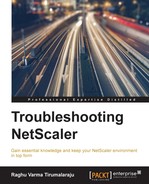The show techsupport utility runs a perl script to collect a number of log files and command outputs. The utility's primary purpose is for Citrix Techsupport Engineers to collect all necessary logs and debug info via a single command. But it is also useful to you as an Administrator as it provides you a means to export all the useful logs to your local machine, which might have your preferred tools, such as Textpad, to examine them.
The easiest means is to use the GUI. It is available under System | Diagnostics | Generate Support File. You can also run the command showtechsupport from CLI or shell and then export the file that gets created in the folder /var/tmp/support/.
The file itself is named with the convention—collector_<primary or secondary (denoted as P/S)>_NSIP_Date_Time. Here's a summary of the useful info it contains.
This is a collection of files each with the output of CLI or shell commands. The key ones are as follows:
showcmds.txt, which contains:- Version and hardware info
- Features and modes configured
- Interfaces and their states and VLAN bindings
- All vServers, Services, and ServiceGroups along with their states
- Policies and their hits
- Routes and bridge table entries
- A copy of the running configuration—very useful as it helps look at the config at the time as opposed to what you find in the
ns.conffile, which might have changed since
statcmds.txt, which contains statistics both for the system as well as for all features/varfolder output, which helps check whether a crash has happened recentlytop, which is the shell command output showing which FreeBSD processes are consuming the most CPU- The ZebOS routing configuration in the way of
vtyshcommands (vtyshcmds.txt)
